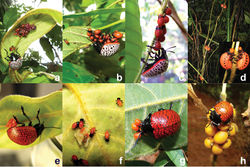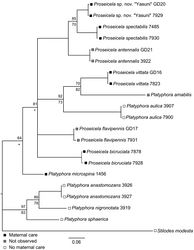Doryphora reticulata
| Notice: | This page is derived from the original publication listed below, whose author(s) should always be credited. Further contributors may edit and improve the content of this page and, consequently, need to be credited as well (see page history). Any assessment of factual correctness requires a careful review of the original article as well as of subsequent contributions.
If you are uncertain whether your planned contribution is correct or not, we suggest that you use the associated discussion page instead of editing the page directly. This page should be cited as follows (rationale):
Citation formats to copy and paste
BibTeX: @article{Windsor2013ZooKeys332, RIS/ Endnote: TY - JOUR Wikipedia/ Citizendium: <ref name="Windsor2013ZooKeys332">{{Citation See also the citation download page at the journal. |
Ordo: Coleoptera
Familia: Chrysomelidae
Genus: Doryphora
Name
Doryphora reticulata Fabricius, 1787 – Wikispecies link – Pensoft Profile
Remarks
Recent observations by F.F. reveal clearly that maternal care is expressed by Doryphora (Megistomela) reticulata (Fabr.) in the cerrado of south-central Brazil (Fig. 5) (see also photo in Chaboo 2011[1]). Photographs of this species in the Boqueirão Biological Reserve, Minas Gerais of Brazil (elevation 1200 m; 21°20.76'S, 44°59.49'W) in 2005 clearly show behaviors strikingly similar to that observed in Doryphora paykulli in Panama. Females oviposit on the underside of partially-expanded, apical leaves of Prestonia tomentosa (Apocynaceae) (Fig. 1e, f). Larvae emerge and are tightly straddle-guarded by the female (Fig. 1g), but unlike Doryphora paykulli and Doryphora sp. near punctatissima, no larval cannibalism of eggs was observed. Larvae guarded by the mother continued to feed on leaves and strip cortex, eventually descending to the ground tended by the mother prior to pupating nearby in the soil (Fig. 1h). Indeed, of the many Chrysomelinae species associated with Solanaceae and other plant families studied at Serra do Japi and other sites near Campinas in Central Brazil (Table 1), Doryphora reticulata is the only species in which mothers are known to actively guard their larval brood. Inferences regarding subsocial habits in Platyphora conviva (Reid et al. 2009[2]) are incorrect according to J. Vasconcellos-Neto (personal communication, 2013). Further, ongoing studies in the eastern lowlands of Bolivia by one of the authors (D.W.) have found no evidence of maternal care occurring in any of 16 species of Doryphorini.
Taxon Treatment
- Windsor, D; Dury, G; Frieiro-Costa, F; Susanne Lanckowsky, ; Pasteels, J; 2013: Subsocial Neotropical Doryphorini (Chrysomelidae, Chrysomelinae): new observations on behavior, host plants and systematics1 ZooKeys, 332: 71-93. doi
Other References
- ↑ Chaboo C (2011) Defensive Behaviors in Leaf Beetles: From the Unusual to the Weird. In: Vivanco J Weir T (Eds) Chemical Biology of the Tropics. Springer Berlin Heidelberg: 59-69. doi: 10.1007/978-3-642-19080-3_4
- ↑ Reid C, Beatson M, Hasenpusch J (2009) The morphology and biology of Pterodunga mirabile Daccordi, an unusual subsocial Chrysomeline (Coleoptera: Chrysomelidae). Journal of Natural History 43: 373-398. doi: 10.1080/00222930802586016
Images
|

